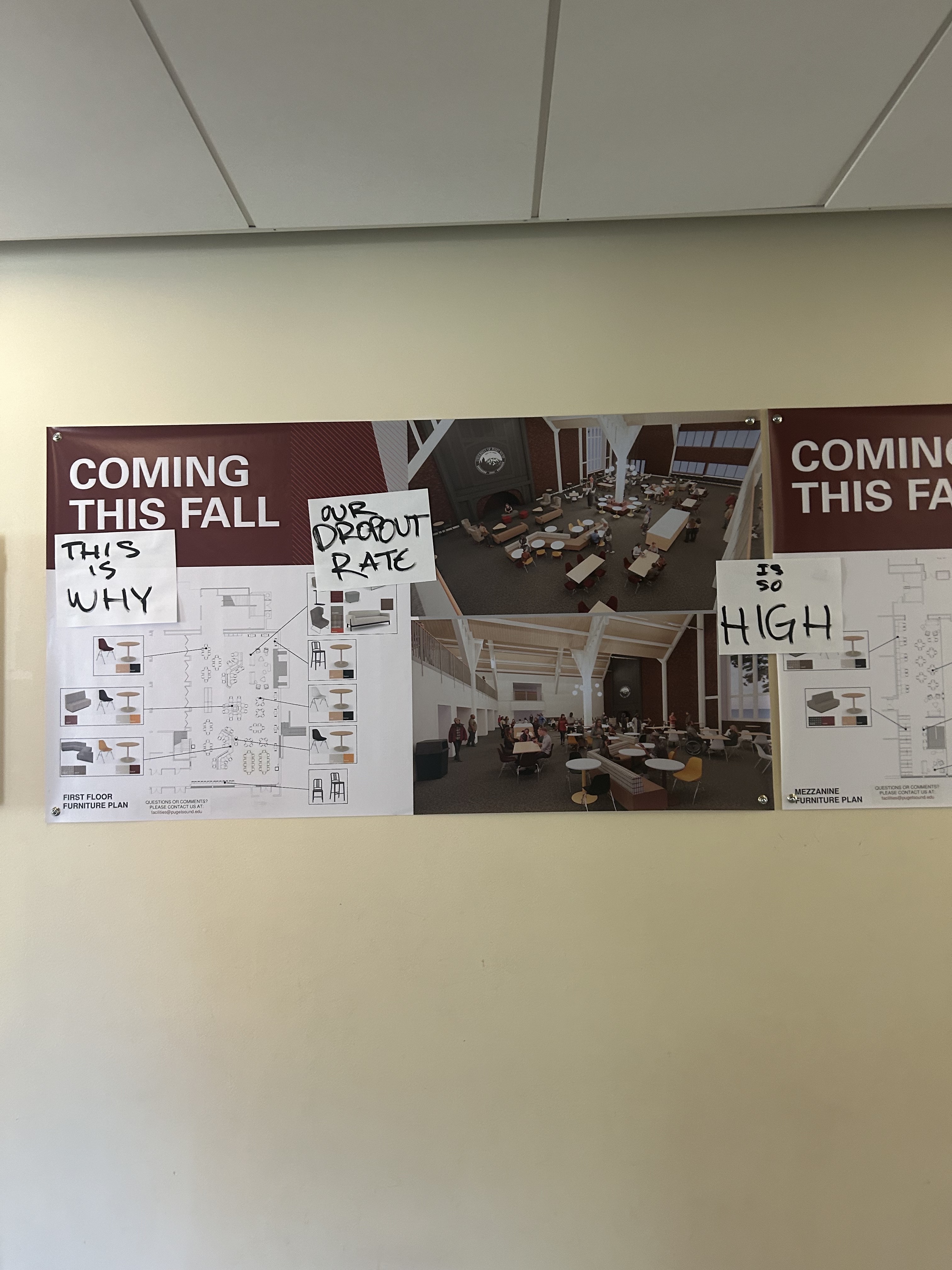
By Mercer Stauch
The University of Puget Sound will undertake a major remodeling project in the Student Union Building (SUB) this summer. The plans, which have been posted in the SUB on large posters, most notably alter the seating style of the main floor dining area. The current long-table setup will be replaced with many smaller tables, counters, and furniture at varying heights that will be rearrangeable. The seating capacity of the SUB will be increased or remain unchanged, according to Bob Kief, Associate Vice President for Facilities Services. The remodel will begin on May 6 with planned completion prior to the start of fall semester.
This new design was developed using feedback from the Campus Development Plan (formerly Master Plan) engagement phase, which collected preferences through focus groups and open sessions with students and staff. The design team, which included student representatives, responded to what Kief described as “a common theme” that emerged from the engagement phase: “Dining hall large tables are not inviting– can be intimidating and make people feel on-display.”
Despite this, the plans for the remodel were met with pushback. The posters that display artist renderings of the proposed changes were pasted over by printer paper reading “This is why our dropout rate is so high,” and “Not enough space.” Notably, these criticisms were posted during an admitted students weekend, and were seen by prospective students and their families before being removed.
Some students have expressed disappointment at the prospect of losing the big table setup. Amy Madsen ‘26, a member of the swim team, worries it’ll disrupt the team tradition of large meals together outside of practice. “We really love to do this for our freshmen and for the recruits to make them feel welcome and show them they already have an entire group of friends. I worry that the new SUB plan just won’t allow teams of our size to sit all together,” Madsen said.
Kief responded to this concern by explaining that while planning these changes, “maintaining the community feel and character of the space was a priority.” He doesn’t believe that the opportunity to hold big gatherings in the SUB will be lost. He claims the new flexible model will be able to “accommodate both private and large group gatherings.”
Eleanor Winterfeldt ‘26, a member of the Puget Sound Adelphian Concert Choir, isn’t convinced. “The posters hanging up say there will be more available seating, which is technically true (170 vs 173), but comes at the steep price of a sense of lost community,” she said. “This year we’ve had multiple occasions where we’ve filled up an entire long table and had to pull up chairs on either end… It’s disappointing to think that new furniture could lead to the end of the community that I and many others have grown used to.”
The decision to remodel the SUB, according to Kief, was an easy one; an upgrade to a space that so many students use every day would be “high-impact improvements at a relatively low cost” that would be felt by the whole campus community. The same sentiment applies to the other remodeling projects taking place this summer, including in Howarth and Regester Halls, as well as upgrades to the keycard swipe access system and the campus electrical system. These projects are funded by the Facilities Services Planned Major Maintenance Capital budget, a segment of the Finance & Administration and General Institutional Within the Educational and General Budget. Since 2009-10, the Operating and Capital budget, under which remodeling projects fall, has seen a $521,000 increase, which the 2022-2023 Budget Overview attributes mainly to the growing cost of new software, e-meeting rooms, and lab upgrades, among other items. Projects like the SUB remodel are similarly financed in an effort to keep University resources and spaces up-to-date.
Still, some students aren’t interested in a change. Winterfeldt told The Trail that there’s “nothing wrong with the tables now, and word on the street is that Loggers live green! Not very green to get new, unwanted, unnecessary furniture.”
